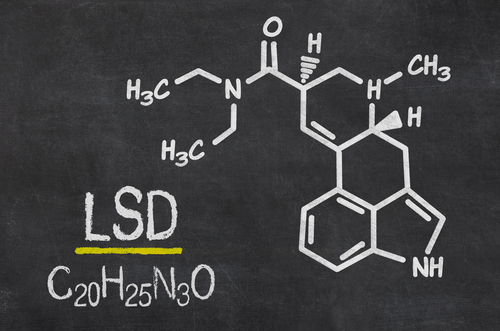Short answer
Acid is bad for you. While “Acid” means LSD, it is not a safe drug concerning both the short- and long-term. While it may have some benefits to certain people, the negatives can quickly outweigh them.
Long answer
Acid is a common street name for LSD, which stands for Lysergic acid diethylamide. LSD is a semi-synthetic compound, first synthesized by Albert Hoffman in 1938. The drug is known a semi-synthetic, rather than a full synthetic, because its synthesis requires a natural component, ergot, a type of fungus, for its production. Ergot is a fungus that grows on rye, and in the Middle Ages it was responsible for a lot of the hallucinations blamed on witchcraft. LSD is essentially Ergot that has had its chemical structure modified in a laboratory. When Albert Hoffman, a Swiss chemist, created the molecule, he was working for the renowned Sandoz Pharmaceutical company, trying to develop a good medicine. Other drugs based off of Ergot had proven to work well in the medical industry, but all had shown some problems that made them unmarketable, forcing Hoffman to continue on his search for a molecule that worked. When he accidentally ingested a small amount of his experiment, only a few hundred micrograms, the result astounded him. Riding home on his bicycle, he experienced what is now known as an LSD “trip”.
Before being banned around the world in the late 1960s, LSD enjoyed a few decades of fame within the psychiatric and medical communities. At first, it was believed that people under the influence of the drug could be models for the experiences schizophrenics went through. This idea still persists in the culture, and people believe that Acid will make you go crazy. Acid has actually been well studied in the medical community. Its effects are very well understood medically, and the studies have opened up new areas of biology, such as the discovery of serotonin, a neurotransmitter, which LSD was found to act upon.
The safety of drugs can be determined and discussed in a variety of ways. One way is to compare the effective dose (how much you take) to the toxic dose (how much will kill you). In this respect, Acid, or LSD, is perhaps the safest drug, in that its effective dose is 100 micrograms, whereas its toxic dose is so high that it is unknown. The toxic dose is thousands, if not millions, of times more than the effective dose. Compare this with alcohol, where the toxic dose can be as low as five or ten times the effective dose.
However, in other ways, LSD can be quite dangerous. Nearly everyone is familiar with the aging “acidhead,” or LSD aficionado who has seemingly “fried” his brain on acid. The medical studies do not provide any data on the effects of LSD over a period of decades of frequent use, but there are many people in the USA and beyond that have used and abused the drug in this manner. The human mind was not meant to function in such a way, especially at high frequency.
Just because LSD is a physically safe chemical, it does not mean it is psychologically safe. R. Crumb, the noted cartoonist, said that while LSD inspired his most famous work, it also had a very bad effect on his psychological health. After he took LSD, he found that the working world appeared flat and meaningless to him. He was unable to continue his regular life, working at a greeting card company in Ohio. For decades later, he woke up each morning to a kaleidoscope of images flashing before his eyes.
There are many other dangers associated with Acid. The high production costs and risks associated with procuring the Ergot tartrate needed to produce LSD, therefore most “Acid” purchased on the street is either adulterated LSD, or a chemical unrelated to LSD. The illegal chemists who produce LSD in underground labs may not have the knowledge, training, time, or equipment to properly purify their product, making the “Acid” possibly quite dangerous. A lethal dose of one of these drugs may only be twice its effective dose. Unfortunately, many people have died taking street acid, a drug they assumed to be relatively safe.
Possible short-term side effects
- increased pulse rate
- difficulty breathing
- panic attacks
- euphoria
Possible long-term side effects
- unknown psychological effects
- depletion of brain glycogen
- overdose
- death
Ingredients to be aware of
- dangerous unknown chemicals

Benefits
- possible psychiatric benefits
 Approved by
Approved by 















